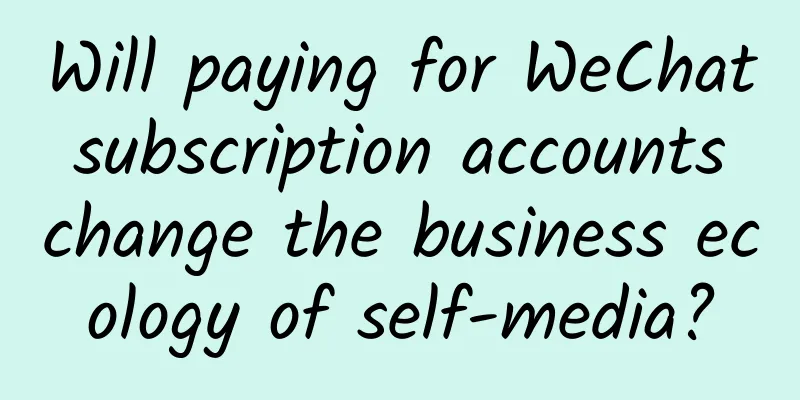Will paying for WeChat subscription accounts change the business ecology of self-media?

|
On the afternoon of February 14, IT commentator Hong Bo published an article in his circle of friends titled "Why I started selling myself now and will this public account be updated?", saying that he would open a paid column. Soon, Tencent Chairman and CEO Ma Huateng commented on the circle of friends, "We should wait for WeChat official accounts to have paid reading," and responded to the question of "testing for too long" by saying "We have already given feedback and will try to speed up." This also means that Tencent has planned to speed up the launch of the WeChat official account paid reading function. In fact, as early as February 2016, Tencent subscription accounts tested paid reading, which required a price to be set for a single article before it could be read. Later in August, it tested paid subscriptions, which required monthly payments to a public account to view part of its content. However, these two features have not yet been launched on a large scale. Judging from Ma Huateng's feedback, the paid subscription function will be launched soon. What does this mean for subscription accounts? And what impact will it have on Internet media? 1. Why do you need a paid subscription? For a long time, the content on the Internet was free. Paid content will soon be replaced by free content. So Internet content is free. But recently, many Internet companies' paid content has begun to emerge. In 2016, Fenda was launched to find a way to monetize content websites that had difficulty monetizing. Later, Zhihu Live and Weibo followed suit. In this case, it is normal for WeChat, as the APP with the most installations and users, to want to help subscription account authors monetize their content. Because the current WeChat ecosystem is a bit like Weibo, where big accounts make a lot of money through soft articles and advertisements, while the platform itself can only earn advertising fees. This is not satisfactory for the platform. As for this method of content monetization, the platform can take a commission, which means that the influence of big accounts can be turned into income for the platform, thus improving the efficiency of the platform. For big accounts, you can’t sell your content directly. You have to look at the advertising and public relations budgets of upstream manufacturers and the attitude of public relations companies. You have to write content to get as many clicks as possible (there are also a lot of cheating to buy clicks), which is also quite painful. Content monetization can generate relatively stable income from fans, which is beneficial for top authors. Authors can make money, and Tencent can also ensure that excellent authors publish content on its own platform and prevent them from migrating to other platforms. So, Tencent wants to offer this paid subscription. 2. Conflict between Payment and Dissemination Since WeChat launched the public account platform, we-media has become a place where heroes are judged by the number of readers. It is not important whether the article is of high quality and has content, but whether it can attract readers to open it and attract readers to subscribe. As long as there are readers (many accounts do not hesitate to falsify the number of readers on a large scale in order to cheat companies’ public relations and advertising budgets), there will be advertising orders and soft-article orders, and you can also quote a relatively high price to obtain monetization. Driven by this business model, self-media often cater to the largest number of readers and collect IQ taxes. The words in the most widely circulated self-media articles often do not represent the author's true intentions, but the author deliberately chooses words that the target fans like to hear the most. If it is for primary school students, it should tell them that it is right not to do homework. If it is for older unmarried women, it should tell them that it is right not to get married. However, the author controls her children more strictly than anyone else and got married early. Advertising, writing soft articles, acting as a spokesperson, and selling products have all become standard business models over the past few years. Paid reading will change this business model. Originally, you wrote something with great difficulty and with great effort in order to spread it widely and earn advertising fees. But if you ask people to pay to read it, people will stop reading it, and you won’t receive much in fees. The number of subscriptions will drop, and there will be no advertising fees. Therefore, when Tencent was conducting internal testing, not many big accounts activated this feature. 3. Separation of payment and broadcasting should be the solution In fact, payment and dissemination can be made into two separate products. When Guokr and Zhihu were monetizing their content, they did not directly add payment thresholds to the native Q&A or articles, but instead created Fenda, Zhihu, and Zhihu Live. Tencent has more users, so it is easy for it to do similar things and provide big accounts with another way to monetize. Therefore, this paid subscription should be a new product rather than messing with the existing system. Tencent allows subscription accounts to open a paid small account, restrict reading of paid content, and conduct question-and-answer sessions and Live broadcasts, allowing the main account to communicate with readers and generate revenue. The Chinese Internet will easily end up being a giant reaping the benefits. If Tencent launches paid services, it will certainly make a lot of money, and if Tencent uses WeChat to do live broadcasts, it will also have good results. What to do and what not to do is just a strategic need for Tencent. As a winner of Toutiao's Qingyun Plan and Baijiahao's Bai+ Plan, the 2019 Baidu Digital Author of the Year, the Baijiahao's Most Popular Author in the Technology Field, the 2019 Sogou Technology and Culture Author, and the 2021 Baijiahao Quarterly Influential Creator, he has won many awards, including the 2013 Sohu Best Industry Media Person, the 2015 China New Media Entrepreneurship Competition Beijing Third Place, the 2015 Guangmang Experience Award, the 2015 China New Media Entrepreneurship Competition Finals Third Place, and the 2018 Baidu Dynamic Annual Powerful Celebrity. |
>>: The support behind the safety and reliability of new energy vehicles
Recommend
50 financial secrets to improve your wealth
Money is not everything, but it can solve most pr...
IE University: European Technology Insights Report 2024
IE University has released its European Tech Insi...
How to operate a new product?
This problem is universal, and I believe every op...
31 kinds of comets recorded in great detail? The Han people's "astronomy" achievements are incredible!
The vast sky and the starry sky have been fascina...
Xiaohongshu blogger fan training camp: one note to increase 10,000 fans and WeChat traffic skills
Xiaohongshu blogger fan training camp: one note t...
Frequently asked questions about server rental?
Various problems are likely to arise during the s...
How to create product "growth power"?
Being able to demonstrate early growth is a key e...
[Live] Sunflower Technical Director Zhang Xiaofeng: The first case in China to talk about the practice of MySQL InnoDB memcached plugin
What data requirements are there behind remote co...
If you don’t know the geographical knowledge in “Man Jiang Hong”, you are out!
As of now, the total box office of the film "...
Edmunds: It is estimated that the US new car sales in April 2020 will be only 633,260, a year-on-year decrease of 52.5%
Analysts at Edmunds, a professional American auto...
All the copywriting skills were learned in junior high school!
The articles I write are more about copywriting c...
Banners, patches, information streams... Among so many advertising formats, which one is more efficient?
In recent years, programmatic advertising has bec...
The latest study shows that drinking milk increases the risk of cancer? Is it still okay to drink milk?
Needless to say, everyone knows the benefits of d...
Can Dong Mingzhu's Gree washing machine break the Gree mobile phone curse?
Just as the hype about Gree mobile phones died do...
“Earthquake clouds”, “red light in the sky”… Were there early signs of the Shandong earthquake?
According to the China Earthquake Networks Center...









